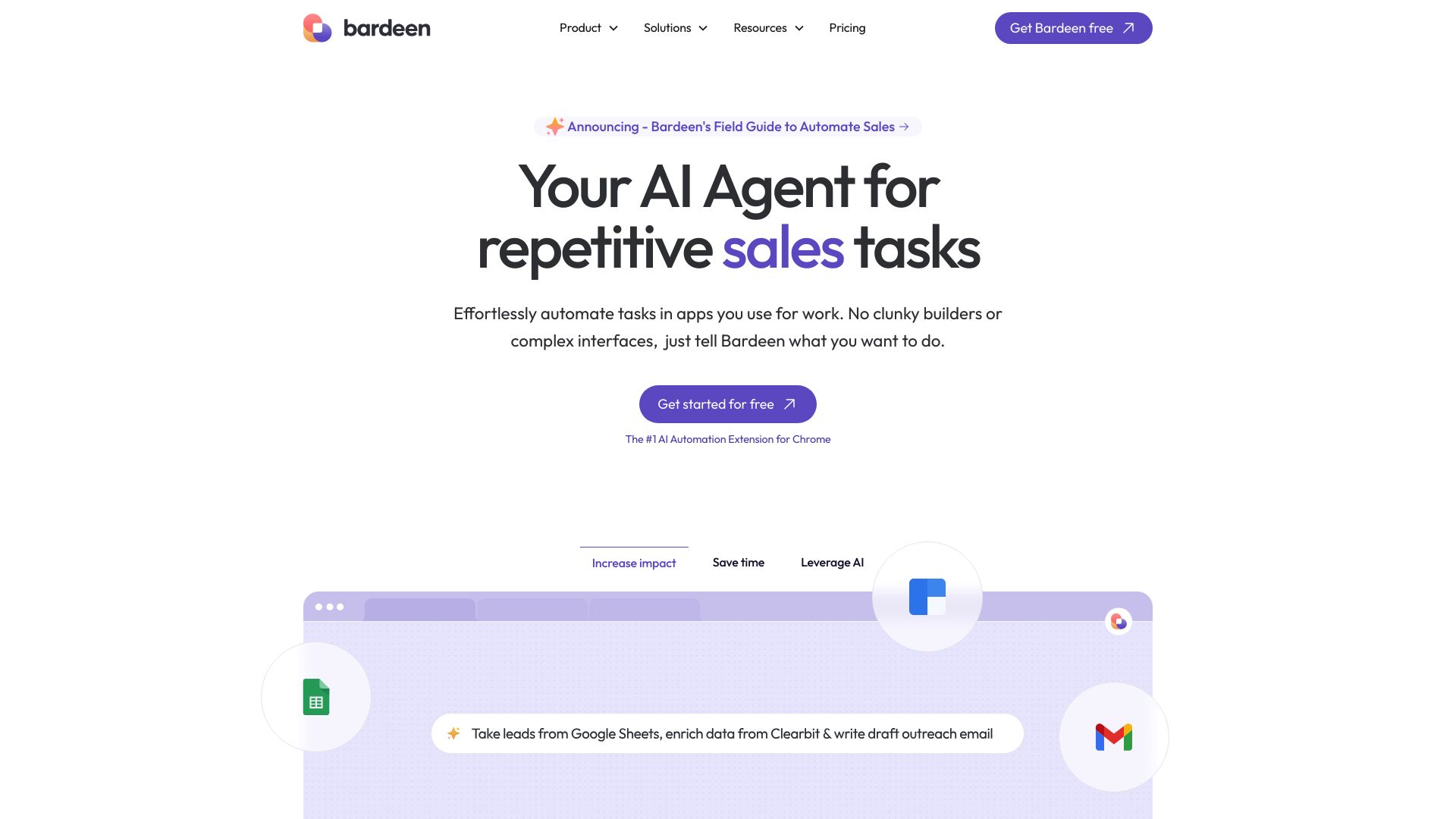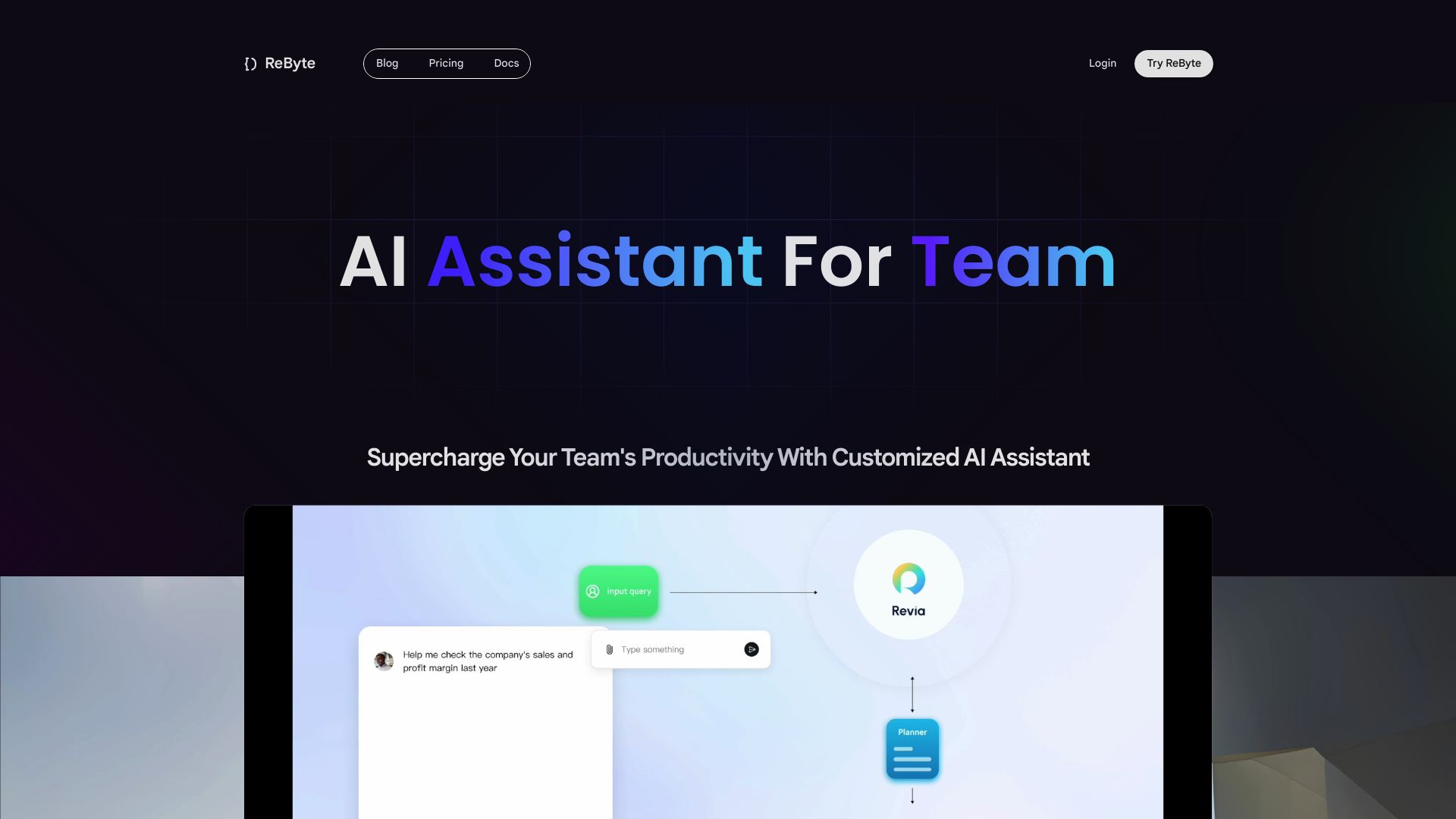Bardeen AI vs. Rebyte: Comparing AI Automation Platforms
AI-powered automation tools have revolutionized how businesses streamline workflows and boost productivity. This review compares two leading platforms, Bardeen AI vs. Rebyte, examining their unique approaches to AI application development. We’ll explore their key features, strengths, and limitations, providing insights to help you choose the right solution for your needs.
Our analysis also introduces SmythOS, a powerful alternative that combines the best of both worlds while offering advanced capabilities for developers, business leaders, and AI enthusiasts alike. Discover how these platforms stack up in terms of usability, scalability, and deployment options, and learn which one might be the perfect fit for your organization’s AI automation goals.
Bardeen AI Overview
Bardeen AI offers a no-code web automation platform that empowers users to streamline repetitive tasks through a Chrome browser extension. The platform’s visual workflow builder enables users to create custom automations, called Playbooks, without coding expertise. Bardeen AI caters to professionals seeking to enhance productivity by automating web-based tasks across popular applications like Gmail, Google Sheets, and LinkedIn.
Bardeen AI offers a no-code web automation platform that empowers users to streamline repetitive tasks through a Chrome browser extension.


Bardeen AI’s key features include a drag-and-drop interface for building workflows, a library of pre-built actions and triggers, and AI-powered capabilities like text classification and data extraction. The platform leverages models such as GPT-3 to enhance automation possibilities. Bardeen AI emphasizes human-in-the-loop interaction, allowing users to validate data, guide automations, and provide inputs as needed.
Bardeen AI’s key features include a drag-and-drop interface for building workflows… and AI-powered capabilities like text classification and data extraction.
While Bardeen AI excels in personalized automation and user participation, it lacks some advanced features found in other AI agent builders. The platform does not offer hosted agents or separate development and production environments. Additionally, Bardeen AI focuses on browser-based robotic process automation (RPA) rather than fully autonomous agents or complex orchestration capabilities.
Bardeen AI integrates with various applications and services, including Zapier, expanding its reach to a wide range of APIs. The platform supports scheduled automations through Autobooks and offers admin analytics dashboards for business and enterprise plans. However, Bardeen AI does not provide features like staging domains, production domains, or deployment as an API.
For users seeking a user-friendly automation tool with AI enhancements, Bardeen AI offers a solid solution. Its strengths lie in visual building, limited collaboration features, and integrations with popular apps. However, those requiring more advanced AI agent capabilities, such as autonomous decision-making or complex problem-solving, may find the platform’s offerings limited compared to more specialized AI agent builders.
Rebyte Overview
Rebyte empowers users to rapidly develop AI-powered applications without extensive coding skills. The platform’s visual agent builder allows creation of customizable AI agents with complex backend logic using large language models. Users can design fully custom user interfaces for these agents without writing code.
Rebyte’s key strengths lie in its integration capabilities, detailed observability of agent processes, and a serverless runtime optimized for production deployment and scaling. The platform manages the entire lifecycle of AI applications from development to deployment, significantly reducing the need for manual coding.
Rebyte empowers users to rapidly develop AI-powered applications without extensive coding skills… Users can design fully custom user interfaces for these agents without writing code.


Rebyte differentiates itself through its focus on democratizing AI application development. The platform aims to enable knowledge workers and teams to automate workflows and enhance productivity using no-code interfaces. This approach makes AI technology accessible to a broader audience, allowing users to transform ideas into deployed applications by simply describing their requirements.
Rebyte differentiates itself through its focus on democratizing AI application development… allowing users to transform ideas into deployed applications by simply describing their requirements.
While Rebyte offers powerful capabilities, it’s important to note that it may have limitations in certain areas. The platform doesn’t emphasize features like hosted agents or separate development and production environments. Additionally, while it supports AI-enhanced automations, it doesn’t focus on fully autonomous agents or multi-agent collaborations.
Rebyte’s vision aligns with the growing trend of empowering end-user programming through AI. As organizations seek to leverage AI for improved efficiency and innovation, platforms like Rebyte play a crucial role in making these technologies accessible and actionable across various industries and skill levels.
Feature Comparison
Bardeen AI and Rebyte offer distinct approaches to AI-powered automation, each with its own strengths and limitations. Bardeen AI excels in browser-based automation through its Chrome extension, providing a visual workflow builder for creating custom Playbooks. Its focus on human-in-the-loop interaction allows users to guide and validate automations. In contrast, Rebyte emphasizes rapid development of AI applications with a visual agent builder and serverless runtime optimized for deployment and scaling.
Core component gaps emerge when comparing the two platforms. Bardeen AI lacks hosted agents and separate development/production environments, which Rebyte provides. Rebyte’s serverless architecture offers advantages in scalability and deployment options not present in Bardeen’s browser-centric model. However, Bardeen AI’s tight integration with web browsers enables seamless automation of web-based tasks, a feature less emphasized in Rebyte’s platform.
Security features also differ between the two. While both platforms implement data encryption and OAuth authentication, Rebyte appears to offer more robust options for deployment and scaling, potentially providing greater flexibility in securing enterprise-level applications. Bardeen AI’s security model focuses on browser-based data protection, which may limit its applicability in certain enterprise scenarios compared to Rebyte’s more comprehensive approach.
SmythOS surpasses both platforms in several key areas. It offers hosted agents with distinct development and production environments, enabling more structured development workflows. SmythOS provides advanced features like multi-agent collaboration, constrained alignment, and a hosted vector database, addressing limitations in both Bardeen AI and Rebyte. Its comprehensive deployment options, including API, webhook, and site chat integrations, offer greater versatility than either competitor. SmythOS’s focus on explainability, debug tools, and audit logs also enhances its appeal for enterprise users seeking transparent and accountable AI solutions.
| Bardeen AI | Rebyte | SmythOS | |
|---|---|---|---|
| CORE FEATURES | |||
| Memory & Context | ❌ | ✅ | ✅ |
| Autonomous Agents | ❌ | ❌ | ✅ |
| Debug Tools | ❌ | ✅ | ✅ |
| Multimodal | ❌ | ❌ | ✅ |
| Problem-Solving Capabilities | ❌ | ✅ | ✅ |
| Multi-Agent Collaboration | ❌ | ❌ | ✅ |
| Audit Logs for Analytics | ❌ | ✅ | ✅ |
| SECURITY | |||
| Constrained Alignment | ❌ | ❌ | ✅ |
| Data Encryption | ✅ | ❌ | ✅ |
| OAuth | ✅ | ❌ | ✅ |
| IP Control | ❌ | ❌ | ✅ |
| COMPONENTS | |||
| Foundation AIs | ❌ | ✅ | ✅ |
| Huggingface AIs | ❌ | ❌ | ✅ |
| Zapier APIs | ❌ | ✅ | ✅ |
| Classifiers | ✅ | ❌ | ✅ |
| Logic | ❌ | ❌ | ✅ |
| Data Lakes | ❌ | ❌ | ✅ |
| DEPLOYMENT OPTIONS (EMBODIMENTS) | |||
| Deploy as API | ❌ | ✅ | ✅ |
| Deploy as Webhook | ❌ | ❌ | ✅ |
| Staging Domains | ❌ | ❌ | ✅ |
| Production Domains | ❌ | ❌ | ✅ |
| API Authentication (OAuth + Key) | ❌ | ❌ | ✅ |
| Deploy as Site Chat | ❌ | ✅ | ✅ |
| Deploy as Scheduled Agent | ✅ | ❌ | ✅ |
| Deploy as GPT | ❌ | ✅ | ✅ |
| DATA LAKE SUPPORT | |||
| Hosted Vector Database | ❌ | ✅ | ✅ |
| Sitemap Crawler | ❌ | ❌ | ✅ |
| YouTube Transcript Crawler | ✅ | ❌ | ✅ |
| URL Crawler | ❌ | ❌ | ✅ |
| Word File Support | ❌ | ✅ | ✅ |
| TXT File Support | ❌ | ✅ | ✅ |
Best Alternative to Bardeen AI and Rebyte
SmythOS stands out as the premier alternative to Bardeen AI and Rebyte, offering a comprehensive AI automation platform that surpasses both in capability and versatility. Our solution combines powerful features with an intuitive interface, making advanced AI accessible to users of all skill levels.
We provide hosted agents for both development and production environments, enabling seamless workflows from testing to deployment. Our visual builder and no-code options democratize AI development, allowing users to create sophisticated agents without extensive programming knowledge. SmythOS excels in memory and context management, ensuring AI agents maintain coherent interactions across sessions.
SmythOS stands out as the premier alternative to Bardeen AI and Rebyte, offering a comprehensive AI automation platform that surpasses both in capability and versatility.
Unlike Bardeen AI and Rebyte, we offer true autonomous agents capable of independent problem-solving and decision-making. Our platform supports multi-agent collaboration, enabling complex task orchestration beyond the capabilities of our competitors. We also prioritize explainability and transparency, providing robust debug tools and audit logs for full visibility into agent operations.
SmythOS distinguishes itself through unparalleled deployment flexibility. We support API, webhook, site chat, and scheduled agent deployments, as well as integration with popular AI platforms. Our scalable architecture ensures performance at any level of operation, from small businesses to enterprise-grade solutions. With SmythOS, users gain a future-proof AI automation platform that adapts to evolving needs and unlocks limitless possibilities for innovation and efficiency.
Conclusion
Bardeen AI and Rebyte offer unique approaches to AI-powered automation, each with distinct strengths. Bardeen AI excels in browser-based task automation through its Chrome extension, providing an accessible platform for users to create custom workflows. Rebyte focuses on rapid AI application development with a visual agent builder and serverless runtime, emphasizing scalability and deployment options.
SmythOS emerges as the superior choice, combining the strengths of both platforms while addressing their limitations. Our comprehensive suite of features includes hosted agents, separate development and production environments, and advanced capabilities like multi-agent collaboration and constrained alignment. SmythOS’s versatile deployment options, including API, webhook, and site chat integrations, provide unparalleled flexibility for various use cases.
For developers, business leaders, and AI enthusiasts alike, SmythOS offers a powerful, user-friendly platform that democratizes AI development without compromising on advanced functionality. We invite you to experience the future of AI automation by creating a free SmythOS account. Discover how our platform can transform your workflows, enhance productivity, and drive innovation across your organization.
Last updated:
Disclaimer: The information presented in this article is for general informational purposes only and is provided as is. While we strive to keep the content up-to-date and accurate, we make no representations or warranties of any kind, express or implied, about the completeness, accuracy, reliability, suitability, or availability of the information contained in this article.
Any reliance you place on such information is strictly at your own risk. We reserve the right to make additions, deletions, or modifications to the contents of this article at any time without prior notice.
In no event will we be liable for any loss or damage including without limitation, indirect or consequential loss or damage, or any loss or damage whatsoever arising from loss of data, profits, or any other loss not specified herein arising out of, or in connection with, the use of this article.
Despite our best efforts, this article may contain oversights, errors, or omissions. If you notice any inaccuracies or have concerns about the content, please report them through our content feedback form. Your input helps us maintain the quality and reliability of our information.
